-
 Bitcoin
Bitcoin $113900
-1.39% -
 Ethereum
Ethereum $3517
-4.15% -
 XRP
XRP $3.009
1.59% -
 Tether USDt
Tether USDt $0.9997
-0.04% -
 BNB
BNB $766.8
-1.41% -
 Solana
Solana $164.6
-2.38% -
 USDC
USDC $0.9998
-0.02% -
 TRON
TRON $0.3277
0.65% -
 Dogecoin
Dogecoin $0.2023
-1.67% -
 Cardano
Cardano $0.7246
0.05% -
 Hyperliquid
Hyperliquid $38.27
-4.77% -
 Sui
Sui $3.528
-0.52% -
 Stellar
Stellar $0.3890
-0.73% -
 Chainlink
Chainlink $16.16
-2.69% -
 Bitcoin Cash
Bitcoin Cash $539.9
-4.38% -
 Hedera
Hedera $0.2425
-2.00% -
 Avalanche
Avalanche $21.71
-0.97% -
 Toncoin
Toncoin $3.662
5.73% -
 Ethena USDe
Ethena USDe $1.000
-0.02% -
 UNUS SED LEO
UNUS SED LEO $8.964
0.35% -
 Litecoin
Litecoin $107.7
2.33% -
 Shiba Inu
Shiba Inu $0.00001223
-0.40% -
 Polkadot
Polkadot $3.617
-0.97% -
 Uniswap
Uniswap $9.052
-2.49% -
 Monero
Monero $295.1
-3.79% -
 Dai
Dai $0.9999
0.00% -
 Bitget Token
Bitget Token $4.315
-1.85% -
 Pepe
Pepe $0.00001060
0.11% -
 Cronos
Cronos $0.1342
-2.72% -
 Aave
Aave $256.0
-0.87%
How to export Coinbase Wallet private keys? Safely back up key information
Exporting private keys from Coinbase Wallet requires careful handling; ensure you're in a secure environment and back up keys safely to protect your digital assets.
May 17, 2025 at 05:35 pm
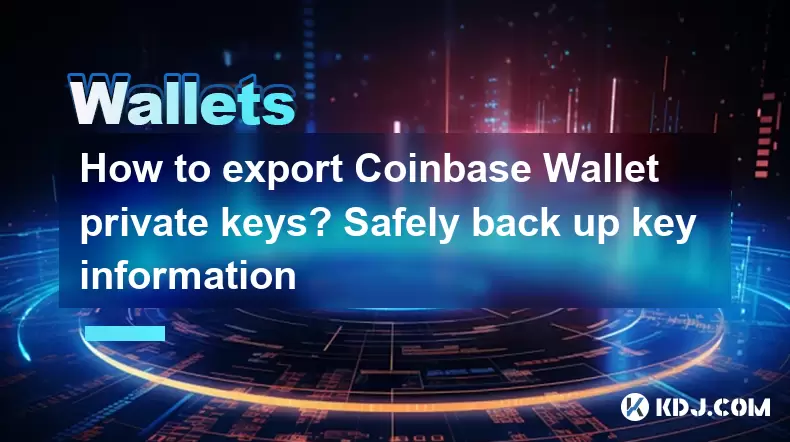
Exporting private keys from Coinbase Wallet is a critical process that requires careful handling to ensure the security of your digital assets. Private keys are essential for accessing and managing your cryptocurrency, and losing them can result in permanent loss of funds. This article will guide you through the process of exporting your private keys from Coinbase Wallet and provide tips on safely backing up this key information.
Understanding Private Keys in Coinbase Wallet
Before diving into the export process, it's important to understand what private keys are and why they are crucial. A private key is a unique alphanumeric code that allows you to access and control your cryptocurrency. In Coinbase Wallet, your private keys are encrypted and stored securely on your device. Exporting these keys allows you to have direct control over your funds, but it also comes with significant responsibility.
Preparing for Export
To ensure a smooth and secure export process, you need to prepare adequately. Here are the steps you should take before exporting your private keys:
- Update Coinbase Wallet: Ensure that you are using the latest version of the Coinbase Wallet app. This can help prevent any technical issues during the export process.
- Secure Environment: Make sure you are in a private and secure location where no one can see your screen or overhear your actions.
- Backup Plan: Decide on a secure method for backing up your private keys, such as using a hardware wallet or a secure offline storage solution.
Exporting Private Keys from Coinbase Wallet
Now, let's go through the steps to export your private keys from Coinbase Wallet:
- Open Coinbase Wallet: Launch the Coinbase Wallet app on your device.
- Access Settings: Tap on the settings icon, usually located in the top right corner of the app.
- Select Export Private Key: Scroll down and find the option to "Export Private Key." Tap on it.
- Enter Security Details: You will be prompted to enter your password or use biometric authentication (fingerprint or face recognition) to proceed.
- Confirm Export: After authentication, you will see a warning about the risks of exporting your private key. Confirm that you understand the risks and want to proceed.
- View and Copy Private Key: Your private key will be displayed on the screen. You can copy it to your clipboard or write it down manually. Ensure that you do not share this information with anyone.
Safely Backing Up Your Private Keys
Once you have exported your private keys, it's crucial to back them up securely. Here are some methods to consider:
- Hardware Wallet: Transfer your private keys to a hardware wallet, such as Ledger or Trezor. These devices are designed to store private keys offline, providing an extra layer of security.
- Paper Wallet: Write down your private keys on a piece of paper and store it in a secure location, such as a safe or a safety deposit box. Make sure to use a pen and avoid digital copies.
- Encrypted Digital Storage: If you prefer digital storage, use an encrypted USB drive or a secure cloud storage service with strong encryption. Ensure that you use a strong password and enable two-factor authentication.
Best Practices for Private Key Security
To maintain the security of your private keys, follow these best practices:
- Limit Access: Only export your private keys when absolutely necessary. The fewer times you handle them, the lower the risk of exposure.
- Regular Backups: Regularly back up your private keys to multiple secure locations. This ensures that you have a backup in case one storage method fails.
- Avoid Digital Sharing: Never share your private keys digitally, such as through email or messaging apps. If you need to share them with someone, do so in person and ensure they understand the importance of keeping them secure.
- Monitor for Breaches: Keep an eye on any news or alerts about potential security breaches in the cryptocurrency space. If you suspect your private keys may have been compromised, take immediate action to secure your funds.
Recovering Lost Private Keys
If you lose your private keys, it can be challenging to recover them. Here are some steps you can take if you find yourself in this situation:
- Check Backups: If you have backed up your private keys, check all your backup locations to see if you can find them.
- Contact Support: Reach out to Coinbase Wallet support for assistance. They may be able to provide guidance or help you recover your keys if you have followed their recommended backup procedures.
- Use Recovery Phrases: If you have a recovery phrase (also known as a seed phrase) associated with your wallet, you can use it to restore your wallet and regain access to your funds.
Frequently Asked Questions
Q: Can I export private keys from Coinbase Wallet on a desktop?
A: Currently, Coinbase Wallet is primarily a mobile app, and the process to export private keys is designed for mobile devices. If you need to access your private keys on a desktop, consider using a hardware wallet that supports desktop access.
Q: Is it safe to store my private keys on a cloud service?
A: Storing private keys on a cloud service can be risky due to potential security breaches. If you choose to use cloud storage, ensure it is encrypted and protected with strong passwords and two-factor authentication. However, offline storage methods like hardware wallets or paper wallets are generally safer.
Q: What should I do if someone else sees my private key during the export process?
A: If someone else sees your private key, immediately transfer your funds to a new wallet with a new set of private keys. This will help protect your assets from potential theft. Also, consider changing any passwords or security measures associated with your cryptocurrency accounts.
Q: Can I use the same private key for multiple wallets?
A: It is not recommended to use the same private key for multiple wallets. Each wallet should have its own unique private key to maximize security. Using the same key across multiple wallets increases the risk of losing all your funds if the key is compromised.
Disclaimer:info@kdj.com
The information provided is not trading advice. kdj.com does not assume any responsibility for any investments made based on the information provided in this article. Cryptocurrencies are highly volatile and it is highly recommended that you invest with caution after thorough research!
If you believe that the content used on this website infringes your copyright, please contact us immediately (info@kdj.com) and we will delete it promptly.
- Phishing, Wallets, and Stolen Funds: Staying Safe in the Wild West of Crypto
- 2025-08-02 16:30:12
- Rare Coin Alert: Is That 50p in Your Pocket Worth £10,000?
- 2025-08-02 16:30:12
- Arbitrum (ARB) Price Prediction: Oversold Signal or Breakout Imminent?
- 2025-08-02 16:55:36
- Arbitrum (ARB): Navigating Price Dips, PayPal Perks, and the Road Ahead
- 2025-08-02 17:00:12
- CoinDCX, Coinbase, and Cyber Heists: A Crypto Rollercoaster
- 2025-08-02 14:30:12
- Solana, Axiom Exchange, and Revenue: Navigating the Future of DeFi
- 2025-08-02 12:50:12
Related knowledge

What is a watch-only wallet in Trust Wallet?
Aug 02,2025 at 03:36am
Understanding the Concept of a Watch-Only WalletA watch-only wallet in Trust Wallet allows users to monitor a cryptocurrency address without having ac...

How to switch between networks in Trust Wallet?
Aug 02,2025 at 12:36pm
Understanding Network Switching in Trust WalletSwitching between networks in Trust Wallet allows users to manage assets across different blockchains s...
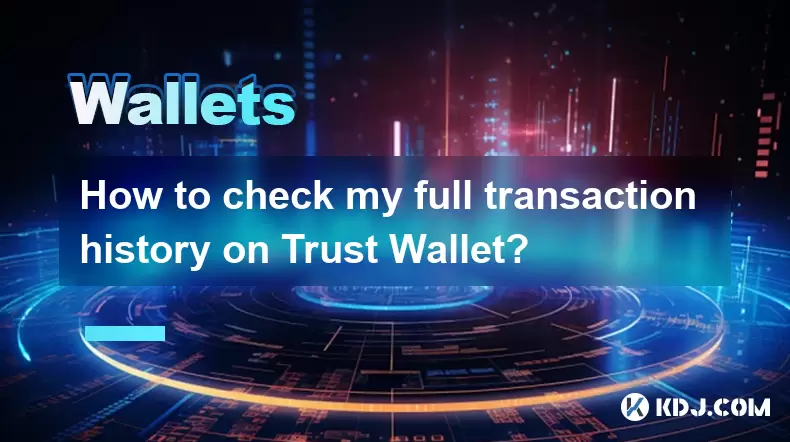
How to check my full transaction history on Trust Wallet?
Aug 02,2025 at 09:24am
Understanding Transaction History in Trust WalletTrust Wallet is a widely used non-custodial cryptocurrency wallet that supports a broad range of bloc...
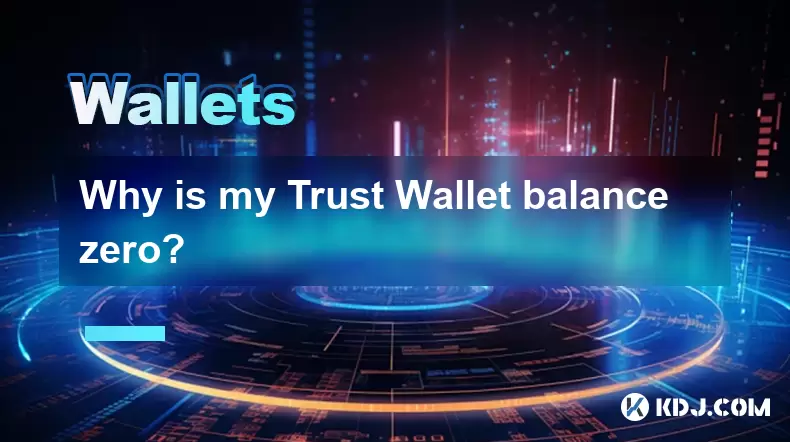
Why is my Trust Wallet balance zero?
Aug 02,2025 at 03:49am
Understanding Trust Wallet Balance Display IssuesIf you're seeing a zero balance in your Trust Wallet despite knowing you've previously received or se...
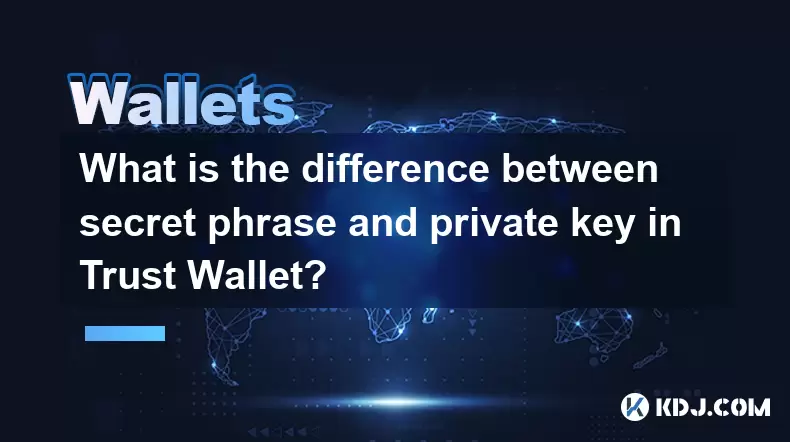
What is the difference between secret phrase and private key in Trust Wallet?
Aug 02,2025 at 09:49am
Understanding the Role of a Secret Phrase in Trust WalletThe secret phrase, also known as a recovery phrase or seed phrase, is a sequence of 12 or 24 ...
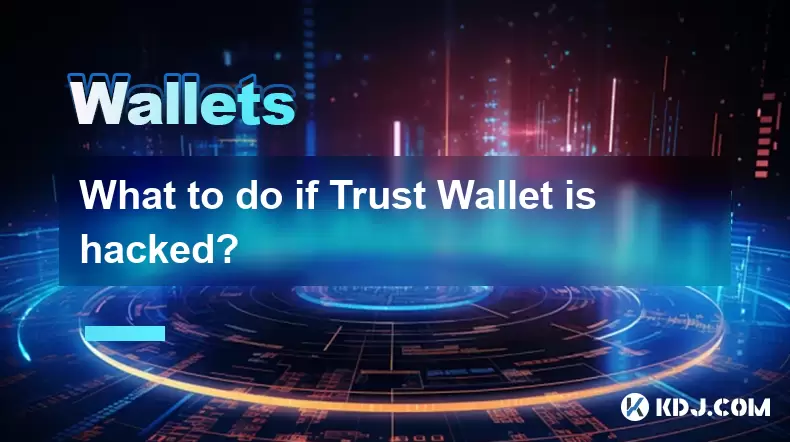
What to do if Trust Wallet is hacked?
Aug 02,2025 at 03:56pm
Immediate Actions to Take If Your Trust Wallet Is CompromisedIf you suspect that your Trust Wallet has been hacked, the first priority is to act swift...

What is a watch-only wallet in Trust Wallet?
Aug 02,2025 at 03:36am
Understanding the Concept of a Watch-Only WalletA watch-only wallet in Trust Wallet allows users to monitor a cryptocurrency address without having ac...

How to switch between networks in Trust Wallet?
Aug 02,2025 at 12:36pm
Understanding Network Switching in Trust WalletSwitching between networks in Trust Wallet allows users to manage assets across different blockchains s...

How to check my full transaction history on Trust Wallet?
Aug 02,2025 at 09:24am
Understanding Transaction History in Trust WalletTrust Wallet is a widely used non-custodial cryptocurrency wallet that supports a broad range of bloc...

Why is my Trust Wallet balance zero?
Aug 02,2025 at 03:49am
Understanding Trust Wallet Balance Display IssuesIf you're seeing a zero balance in your Trust Wallet despite knowing you've previously received or se...

What is the difference between secret phrase and private key in Trust Wallet?
Aug 02,2025 at 09:49am
Understanding the Role of a Secret Phrase in Trust WalletThe secret phrase, also known as a recovery phrase or seed phrase, is a sequence of 12 or 24 ...

What to do if Trust Wallet is hacked?
Aug 02,2025 at 03:56pm
Immediate Actions to Take If Your Trust Wallet Is CompromisedIf you suspect that your Trust Wallet has been hacked, the first priority is to act swift...
See all articles

























































































